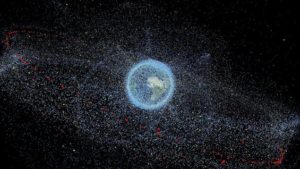
South Korea is considering joining the quest to clean up space debris in Earth orbit, and with it could end up unintentionally developing a dual-use antisatellite (ASAT) system.
Following similar recent efforts by Japan and Europe, South Korea’s Ministry of Science and Information Communication Technology (ICT) held a meeting last week with industry, universities, and institutes in Seoul to discuss technologies to monitor the rising threat of space junk, as well as the development of technologies to remove space debris in Earth’s orbit.
During the meeting, the first of its kind, participants discussed the global trends in relevant technologies, as well as South Korea’s technological capabilities. Participants suggested the establishment of a space surveillance radar system and the development of a janitor satellite tasked with cleaning up space junk.
The radar system would be used to monitor and track space debris above the Korean Peninsula to accurately predict its falling time and location. Such a system would also help South Korea operate its satellites more reliably by monitoring any danger of space debris. The janitor satellite would be equipped with robotic arms or nets to capture space junk.
If developed, the janitor satellite could be regarded by some as a possible antisatellite (ASAT) weapon that could just as easily target, disable, and even destroy an operating satellite as it could clean up space debris.
“The danger of space debris is unavoidable as technology is advancing,” said Choi Won-ho, a ministry official in a report in The Korea Times. “We will review measures of securing technologies to respond to space danger in order to operate satellites stably and ensure the safety of the people.”
The potential threat from space junk has received increased attention recently in light of the defunct Tiangong-1 space station, which fell to Earth last month, raising concerns that inhabited areas could be struck by falling debris from the craft. International efforts are also considering the potential danger from space junk to orbital vehicles with humans aboard.





